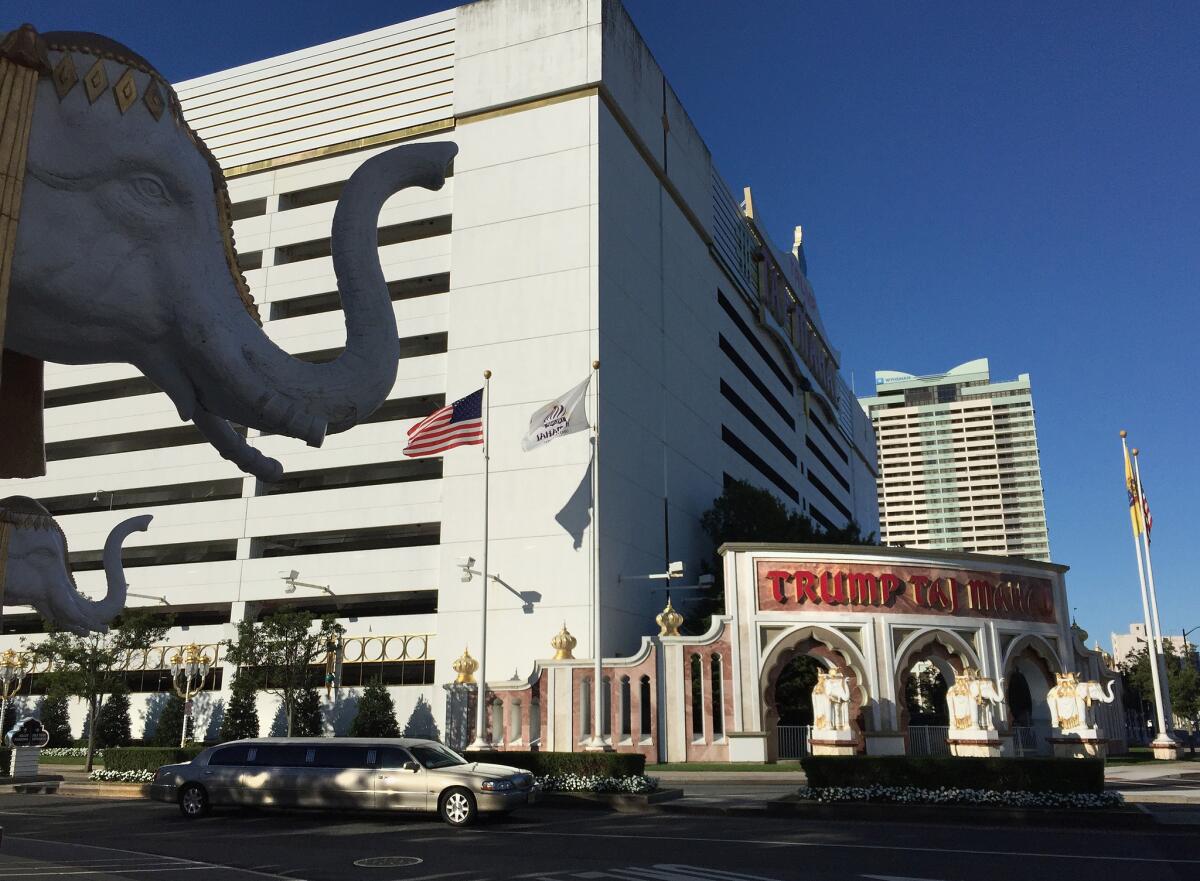Column: Is this the most ‘vicious’ thing Donald Trump ever did in business?

Donald Trump poses for a fan after speaking Monday in South Carolina.
- Share via
Donald Trump’s business career has been getting a fine-toothed comb-over by journalists and analysts spurred on by the seeming success of his presidential campaign. But one revealing episode in his past largely escaped notice, until it was exhumed recently by Jonathan Laing of Barron’s.
That’s curious, because it involves Trump’s investments in Atlantic City, which led to the corporate bankruptcies often cited by his adversaries. And it amounted to his use of bluster and threats in an effort to intimidate a critic -- certainly character traits that have been on display over the last few months.
The episode dates to 1990, when Trump was on the verge of opening his most glamorous Atlantic City casino resort, the Taj Mahal. Marvin Roffman, a highly respected gaming analyst at the Philadelphia brokerage firm Janney Montgomery Scott, advised clients against buying the casino bonds and voiced his doubts to the Wall Street Journal.
He acted viciously towards me because, I guess, he felt that I had personally attacked his brand.
— Former casino analyst Marvin Roffman, on Donald Trump
“When this property opens, he will have had so much free publicity he will break every record in the books in April, June, and July,” he told the Journal. “But once the cold winds blow from October to February, it won’t make it. The market just isn’t there.” The Taj Mahal would be competing for customers in a gambling venue already losing its luster: “Atlantic City is an ugly and dreary kind of place. Even its hard-core customers aren’t coming down as much.”
Wall Street securities analysts are accustomed to getting strong-armed by corporate executives and pressured by their own bosses not to make waves, especially when they could be expensive waves. What Roffman faced raised that pressure to a new level.

The Trump Taj Mahal casino, no longer under Donald Trump’s active management, flirted with closing last year amid Atlantic City’s chronic business woes.
The day the Journal piece appeared, Trump faxed a letter to Janney Chief Executive Norman Wilde, expressing his “outrage” at the quotes, calling Roffman “an unguided missle [sic],” and threatening “a major lawsuit ... unless Mr. Roffman is immediately dismissed or apologizes.”
Within 24 hours, Roffman did so, signing a letter he says was written for him stating, “unquestionably, the Taj’s opening will be the grandest and most successful the City has ever seen.” He appealed to Trump in the “hope that you will let me continue to cover your companies and that you will forgive ... a very unfortunate interview on my part.”
The next day, after hearing that Trump intended to publish the abject letter and concerned that it would mislead clients into a bad investment decision, Roffman had second thoughts. He faxed Trump, retracting the first letter and directing “that you not use it for an[y] purpose.” Trump replied that “only a fool, a highly unstable one at that,” would send the retraction, and reinstating his threat of a lawsuit. Janney Montgomery Scott promptly fired Roffman, ostensibly for retracting the original letter without permission.
We’ve emailed the Trump campaign for comment, but haven’t heard back.
The affair elicited ridicule from the late Alan Abelson, then the editor and a columnist at Barron’s, who called Janney’s action “an act of unsurpassed spinelessness.”
Abelson, the man who invented snark, wrote that Wilde claimed Roffman was “dismissed not even for such flagrant misbehavior as telling The Wall Street Journal that Atlantic City is a fairly repugnant place but, rather, because he retracted his original apology to Mr. Trump, who, however, rest assured, was not uppermost in the minds of Janney Montgomery Scott when they terminated Mr. Roffman. We’re sure that’s true. What was uppermost in their minds was not Mr. Trump but Mr. Trump’s threat of a major lawsuit.”
As it happened, Roffman had the last laugh. The Taj Mahal filed for bankruptcy about a year after Roffman predicted that “it won’t make it.” Roffman sued Trump and brought an arbitration claim against Janney. He settled with Trump on undisclosed terms and won a $750,000 award against Janney.
He also started his own successful investment firm. Reached by Laing in comfortable retirement, he recalled: “In a way I owe Donald Trump a lot because he forced me into a new career that turned out well. But that doesn’t excuse the hell he subjected me to in 1990, sliming my reputation so much that I got fired and couldn’t find another job as an analyst. He acted viciously towards me because, I guess, he felt that I had personally attacked his brand. His image is all-important to him.”
Keep up to date with the Economy Hub. Follow @hiltzikm on Twitter, see our Facebook page, or email [email protected].
More to Read
Inside the business of entertainment
The Wide Shot brings you news, analysis and insights on everything from streaming wars to production — and what it all means for the future.
You may occasionally receive promotional content from the Los Angeles Times.











